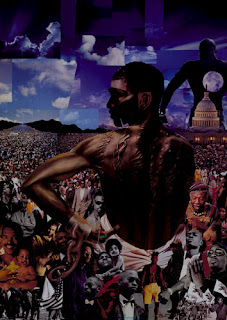In Week 5 there were four chapters about
Communist poets of the 1930s, The Harlem Renaissance, Robert Frost and
Formalism of the 1950s.
In this blog I have shared poems from two
chapters. First is “If We Must Die” by Clause McKay from The Harlem Renaissance
Movement, these poets were a group of African-American
writers who wrote and developed ideas together. Second is “The Death of a Toad” by Richard Wilbur from 1950s Formalism.
It is U.S. poetry in the post war reaction against what was deemed to be
modernist experimental excess. In this course there were introduction of two
Formalists: Richard Wilbur and X.J. Kennedy.
Click on the below image for information about all weeks:
If we must die—let it not be like hogs
Hunted and penned in an inglorious spot,
While round us bark the mad and hungry dogs,
Making their mock at our accursed lot.
If we must die—oh, let us nobly die,
So that our precious blood may not be shed
In vain; then even the monsters we defy
Shall be constrained to honor us though dead!
Oh, Kinsmen! We must meet the
common foe;
Though far outnumbered, let us show us brave,
And for their thousand blows deal one deathblow!
What though before us lies the open grave?
Like men we’ll face the murderous, cowardly pack,
Pressed to the wall, dying, but fighting back!
In this poem Claude McKay has adopted
high poetic diction and rhyme and meter of a Shakespearean sonnet. The poem is
about race relations in the early 20th century. The very first scene
is of war or battle between two groups. They are with the fact that they will
not win the battle but poet encourages them to fight back though they die. If
they die in battle it will be a noble death and the precious blood will not be
shed in vain. The defeat does not matter but what matters is fighting will all
strength and respect. “Oh! Kinsmen” in
the poem is used for everyone including readers to encourage them to fight
against racism.
Another poem is about Formalism
1950.
"The Death of a Toad" (1950) - Richard Wilbur
A toad the
power mower caught,
Chewed and clipped of a leg, with a hobbling hop has got
To the garden verge, and sanctuaried
him
Under the cineraria leaves, in
the shade
Of the ashen and heartshaped
leaves, in a dim,
Low, and a final glade.
The rare original
heartsblood goes,
Spends in the earthen hide, in the folds and wizenings, flows
In the gutters of the banked
and staring eyes. He lies
As still as if he would return
to stone,
And soundlessly attending,
dies
Toward some deep
monotone,
Toward misted and ebullient
seas
And cooling shores, toward lost Amphibia's emperies.
Day dwindles, drowning and at
length is gone
In the wide and antique eyes,
which still appear
To watch, across the
castrate lawn,
The haggard daylight
steer.
In this poem Wilbur has used high poetic
diction and classicism. He has depicted the death of a toad in a garden. There is
description of toad’s helplessness and poet’s sympathy towards it. Here Wilbur
has presented a theme of Man v/s Nature. The Lawn mower has clipped the leg of
toad and killed it and those last movement of Toad’s life has been described
with full of pain. The garden has also described with a satire on modernism. In
the second stanza there is a death of toad and it is presented that after the
death the toad is leading towards some good place (heaven). In this poem there
is a deep satire towards the human activities which harms nature. Wilbur’s
formalism runs contrary to the way the modernist poets approached artifice.

No comments:
Post a Comment